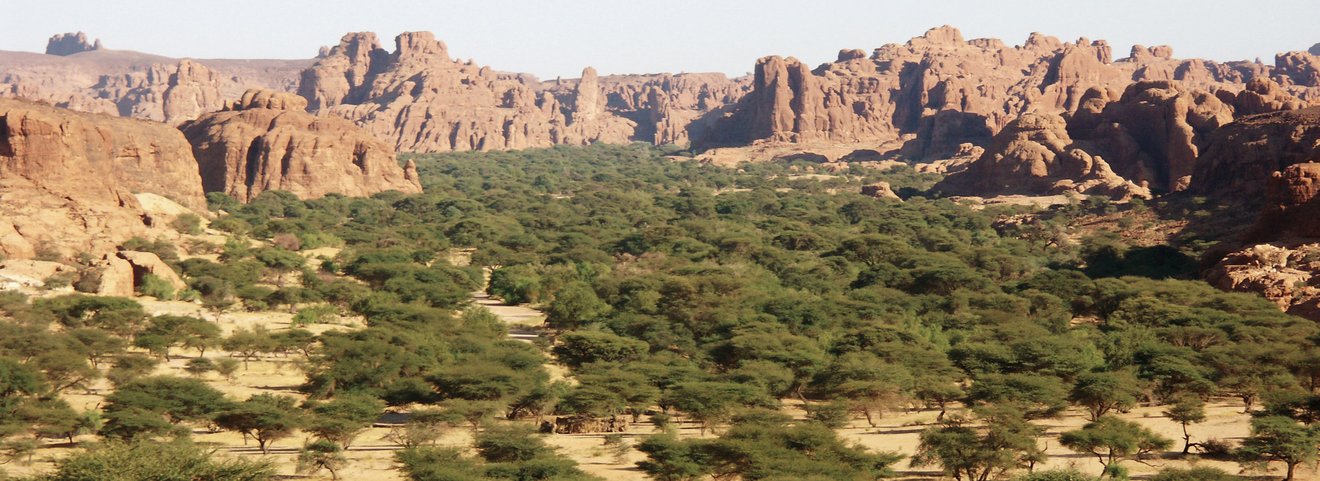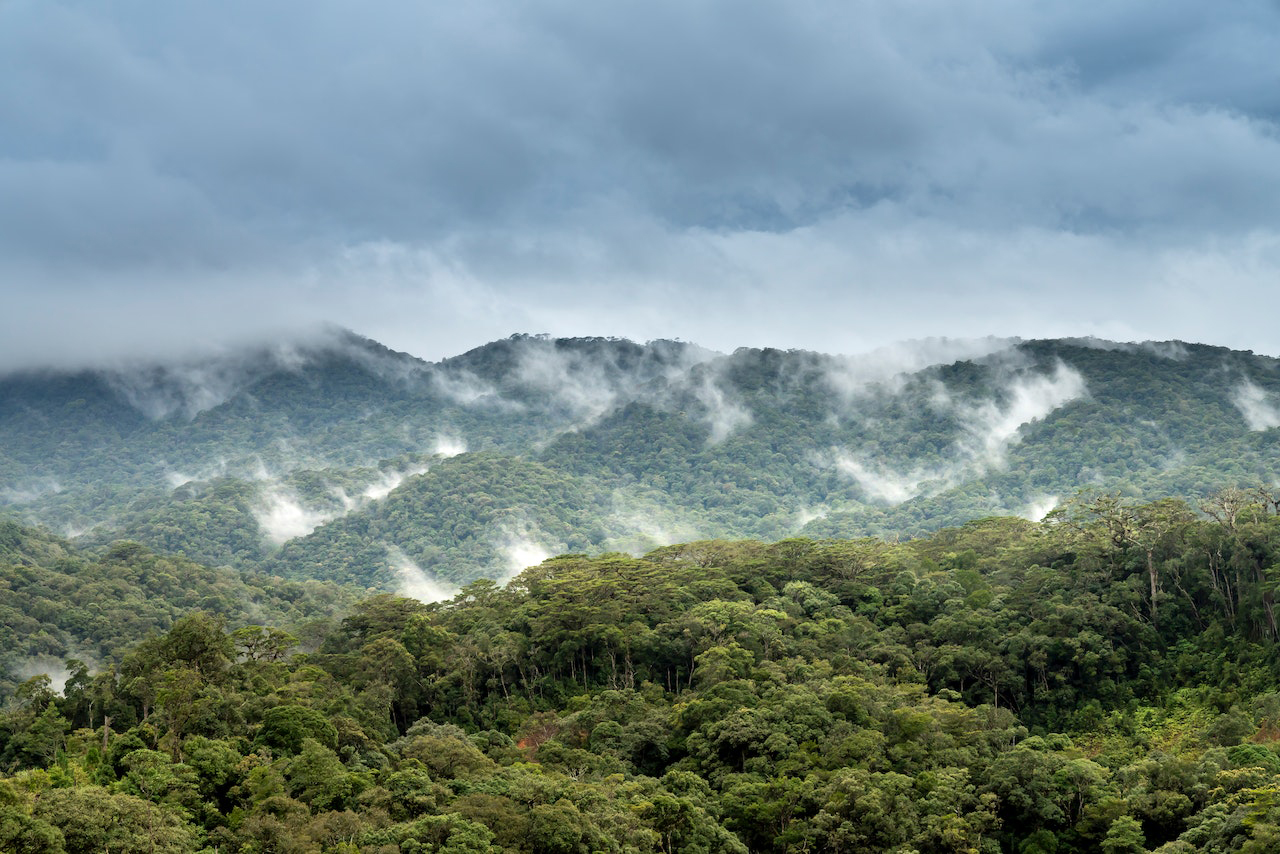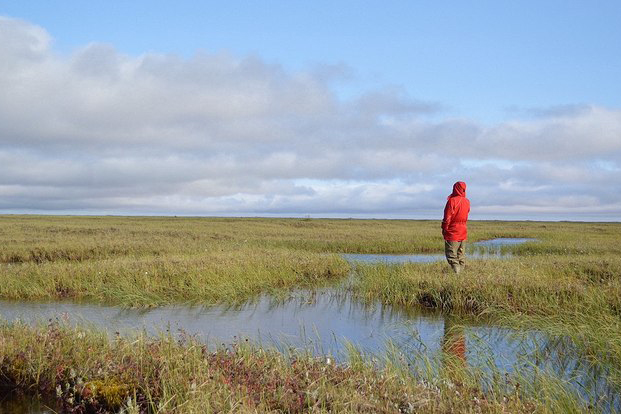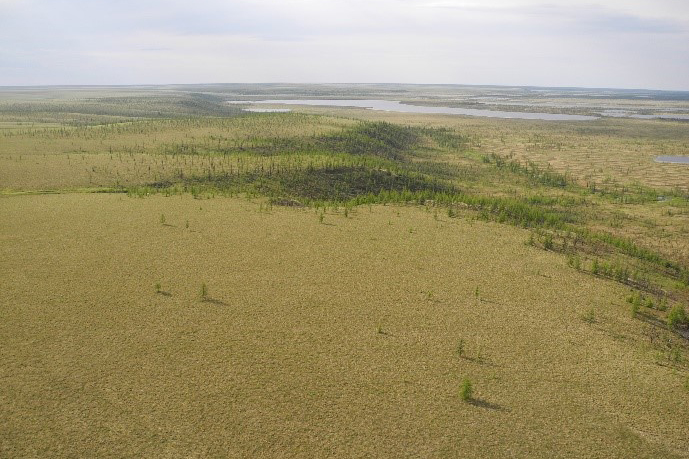
Dynamik des Klima-Vegetation-Systems
Das Klima prägt die Vegetation, und die Vegetation wiederum verändert das Klima, z. B. dadurch, dass Böden und Pflanzen Sonnenlicht unterschiedlich reflektieren oder dass Pflanzen durch Transpiration eine ansonsten trockene Umgebung kühlen. Ziel dieser Forschungsgruppe ist es, die terrestrischen biogeophysikalischen Wechselwirkungsprozesse im Klimasystem der Erde zu verstehen. Daher beschäftigen wir uns mit folgenden Fragen: Wie hat sich die Wechselwirkung zwischen der Atmosphäre, der Vegetation, der Landoberfläche und dem Ozean in der Vergangenheit entwickelt und wie könnte sie sich in Zukunft entwickeln? Unter welchen Bedingungen kann diese Wechselwirkung zu abrupten Übergängen in neue Klima- und Ökosystemzustände führen? (Bildnachweis für die Kopfzeile: Stefan Kröpelin, Köln)

Mitglieder der Gruppe und deren Forschungsgebiet
| Name | Status | Forschungsgebiet |
|---|---|---|
| Martin Claußen | Gruppenleiter | Globale Wechselwirkung im vergangenen und gegenwärtigen Klima |
| Jürgen Bader | Gast (UHH, IfM) | Erdsystemdynamik |
| Anne Dallmeyer | Wissenschaftlerin | Paläovegetationsdynamik |
| Pinhsin Hu | Gast (MPI-BGC, Jena) | Modellierung der funktionellen Vielfalt von Pflanzen und ihrer Wechselwirkung mit dem Klima |
| Leonore Jungandreas | Gast (iDIV, Leipzig) | Wechselwirkung zwischen hochreichender Konvektion und der Landoberfläche im holozänen Nordafrika |
| Christian Reick | Gast | Theorie des terrestrischen Kohlenstoffkreislaufes |
Gruppenmitglieder und Publikationen
- Busch, R., Dallmeyer, A., Herzschuh, U., Pirson, F., Schütt, B. & Becker, F. (2025). Agroclimatic landscapes of Pergamon: modelling agricultral suitability of an ancient city and its environs. PLOS ONE, 20(7): e0325779. [publisher-version][supplementary-material][supplementary-material]
- Dallmeyer, A., Schild, L., Claussen, M., Kleinen, T. & Herzschuh, U. (2025). Challenges and insights in comparing simulated tree cover changes over the last 20,000 years with reconstructions for the Northern Hemisphere. . EGU General Assembly 2025. Vienna, Austria. 2025-04-27 - 2025-05-01 doi:10.5194/egusphere-egu25-8759 [abstract]
- Duque-Villegas, M., Claussen, M., Kleinen, T., Bader, J. & Reick, C. (2025). Pattern scaling of simulated vegetation change in North Africa during glacial cycles. Climate of the Past, 21(4), 773-794. doi:10.5194/cp-21-773-2025 [publisher-version]
- Li, C., Dallmeyer, A., Ni, J., Chevalier, M., Willeit, M., Andreev, A., Cao, X., Schild, L., Heim, B., Wieczorek, M. & Herzschuh, U. (2025). Global biome changes over the last 21,000 years inferred from model-data comparisons. Climate of the Past, 21(6), 1001-1024. doi:10.5194/cp-21-1001-2025 [publisher-version][supplementary-material]
- von Storch, H., Claussen, M., Heimann, M., Sausen, R. & Zorita, E. (2025). Climate science concepts born in Hamburg. Cham: Springer Nature Switzerland AG.
- Zaki, A., Delaunay, A., Baby, G., Haghipour, N., Blanchet, C., Dallmeyer, A., Sternai, P., Woor, S., Wani, O., Khalil, H., Schuster, M., Petraglia, M., Sylvestre, F., Peyrotty, G., Ali, M., Van Buchem, F., Afifi, A. & Castelltort, S. (2025). Monsoonal imprint on late Quaternary landscapes of the Rub’ al Khali Desert. Communications Earth & Environment, 6: 255. [publisher-version][any-fulltext][supplementary-material][supplementary-material][supplementary-material][supplementary-material]
- Specht, N., Claussen, M. & Kleinen, T. (2024). Dynamic interaction between lakes, climate, and vegetation across northern Africa during the mid-Holocene. Climate of the Past, 20, 1595-1613. doi:10.5194/cp-20-1595-2024 [research-data][publisher-version]
- Sylvestre, F., Melles, M., Wennrich, V., Dinies, M., Chalié, F., Swingedouw, D., Dallmeyer, A., Shi, X., Claussen, M., Jaeschke, A., Cocquyt, C., Karls, J., Kuper, J., Mallaye, B., Mazur, J.-C., Pailles, C., Rirongarti, R., Rethemeyer, J., Ritter, B., Schefuß, E., Viehberg, F., Wagner, B., Werner, M., Yacoub, A. & Kröpelin, S. (2024). Drought events during the African humid period suggest future drying of the Sahara. ResearchSquare, . doi:10.21203/rs.3.rs-5288623/v1 [Preprint] [pre-print][supplementary-material][supplementary-material]
- Torres Mendonca, G., Reick, C. & Pongratz, J. (2024). Timescale dependence of airborne fraction and underlying climate-carbon-cycle feedbacks for weak perturbations in CMIP5 models. Biogeosciences, 21, 1923-1960. doi:10.5194/bg-21-1923-2024 [supplementary-material][publisher-version]
- Valencia, S., Villegas, J., Hoyos, N., Duque-Villegas, M. & Salazar, J. (2024). Streamflow response to land use/land cover change in the tropical Andes using multiple SWAT model variants. Journal of Hydrology: Regional Studies, 54: 101888. doi:10.1016/j.ejrh.2024.101888 [publisher-version][supplementary-material][supplementary-material][supplementary-material]
- Bellomo, K., Meccia, V., D’Agostino, R., Fabiano, F., Larson, S., von Hardenberg, J. & Corti, S. (in press). Impacts of a weakened AMOC on precipitation over the Euro-Atlantic region in the EC-Earth3 climate model. Climate Dynamics: available online. doi:10.1007/s00382-023-06754-2
- Brönnimann, S. & Claussen, M. (2023). Zur Aktualität von Humboldts Klimaforschung: Geleitwort. In Nehrlich, T. & Strobl, M. (Eds.), Ueber die Hauptursachen der Temperatur-Verschiedenheit auf dem Erdkörper: Schriften zum Klima / Alexander von Humboldt (pp.9-28). Hannover: Werhahn Verlag.
- Chevalier, M., Dallmeyer, A., Weitzel, N., Li, C., Baudouin, J.-P., Herzschuh, U., Cao, X. & Hense, A. (2023). Refining data-data and data-model vegetation comparisons using the Earth mover's distance (EMD). Climate of the Past, 19, 1043-1060. doi:10.5194/cp-19-1043-2023 [publisher-version]
- Dallmeyer, A., Poska, A., Marquer, L., Seim, A. & Gaillard-Lemdahl, M.-J. (2023). The challenge of comparing pollen-based quantitative vegetation reconstruction with outputs from vegetation models - a European perspective. Climate of the Past, 19, 1531-1557. doi:10.5194/cp-19-1531-2023 [supplementary-material][publisher-version]
- Duque-Villegas, M. (2023). Understanding the dynamics of late Quaternary African humid periods. Phd Thesis, Hamburg: Universität Hamburg. Berichte zur Erdsystemforschung, 272. doi:10.17617/2.3556280 [publisher-version]
- Herzschuh, U., Böhmer, T., Chevalier, M., Dallmeyer, A., Li, C., Cao, X., Hebert, R., Peyron, O., Nazarova, L., Novenko, E., Park, J., Rudaya, N., Schlütz, F., Shumilovskikh, L., Tarasov, P., Wang, Y., Wen, R., Xu, Q. & Zheng, Z. (2023). Regional pollen-based Holocene temperature and precipitation patterns depart from the Northern Hemisphere mean trends. Climate of the Past, 19, 1481-1506. doi:10.5194/cp-19-1481-2023 [publisher-version]
- Herzschuh, U., Böhmer, T., Li, C., Chevalier, M., Hébert, R., Dallmeyer, A., Cao, X., Bigelow, N., Nazarova, L., Novenko, E., Park, J., Peyron, O., Rudaya, N., Schlütz, F., Shumilovskikh, L., Tarasov, P., Wang, Y., Wen, R., Xu, Q. & Zheng, Z. (2023). LegacyClimate 1.0: A dataset of pollen-based climate reconstructions from 2594 Northern Hemisphere sites covering the last 30kyr and beyond. Earth System Science Data, 15, 2235-2258. doi:10.5194/essd-15-2235-2023 [publisher-version]
- Jungandreas, L., Hohenegger, C. & Claussen, M. (2023). How does the explicit treatment of convection alters the precipitation-soil hydrology interaction in the mid-Holocene African humid period?. Climate of the Past, 19, 637-664. doi:10.5194/cp-19-637-2023 [publisher-version]
- Kirsten, F., Dallmeyer, A., Bernbeck, R., Böhmer, T., Busch, R., Hessari, M., Pollock, S. & Schütt, B. (2023). Were climatic forcings the main driver for Mid-Holocene changes in settlement dynamics on the Varmin Plain (Central Iranian Plateau)?. PLoS One. doi:10.1371/journal.pone.0290181 [supplementary-material][publisher-version]
- Shi, X., Werner, M., Yang, H., D'Agostino, R., Liu, J., Yang, C. & Lohmann, G. (2023). Unraveling the complexities of the Last Glacial Maximum climate: the role of individual boundary conditions and forcings. Climate of the Past, 19, 2157-2175. doi:10.5194/cp-19-2157-2023 [publisher-version][supplementary-material]
- Specht, N. (2023). Dynamic interaction between climate, lakes and vegetation over North Africa. Phd Thesis, Hamburg: Universität Hamburg. Berichte zur Erdsystemforschung, 270. doi:10.17617/2.3523251 [publisher-version]
- Dallmeyer, A., Kleinen, T., Claussen, M., Weitzel, N., Cao, X. & Herzschuh, U. (2022). The deglacial forest conundrum. Nature Communications, 13: 6035. doi:10.1038/s41467-022-33646-6 [supplementary-material][multimedia][publisher-version][supplementary-material]
- Duque-Villegas, M., Claussen, M., Brovkin, V. & Kleinen, T. (2022). Effects of orbital forcing, greenhouse gases and ice sheets on Saharan greening in past and future multi-millennia. Climate of the Past, 18, 1897-1914. doi:10.5194/cp-18-1897-2022 [supplementary-material][publisher-version]
- Herzschuh, U., Böhmer, T., Li, C., Cao, X., Hébert, R., Dallmeyer, A., Telford, R. & Kruse, S. (2022). Reversals in temperature-precipitation correlations in the Northern Hemisphere extratropics during the Holocene. Geophysical Research Letters, 49: e2022GL099730. doi:10.1029/2022GL099730 [publisher-version]
- Hu, P.-h. (2022). Impact of plant functional diversity on climate – a modelling study using JeDI-BACH in ICON-ESM. Phd Thesis, Hamburg: Universität Hamburg. Berichte zur Erdsystemforschung, 256. doi:10.17617/2.3430193 [publisher-version]
- Jungclaus, J., Lorenz, S., Schmidt, H., Brovkin, V., Brüggemann, N., Chegini, F., Crueger, T., de Vrese, P., Gayler, V., Giorgetta, M., Gutjahr, O., Haak, H., Hagemann , S., Hanke, M., Ilyina, T., Korn, P., Kröger, J., Linardakis, L., Mehlmann, C., Mikolajewicz, U., Müller, W., Nabel, J., Notz, D., Pohlmann, H., Putrasahan, D., Raddatz, T., Ramme, L., Redler, R., Reick, C., Riddick, T., Sam, T., Schneck, R., Schnur, R., Schupfner, M., von Storch, J.-S., Wachsmann, F., Wieners, K.-H., Ziemen, F., Stevens, B., Marotzke, J. & Claussen, M. (2022). The ICON Earth System Model Version 1.0. Journal of Advances in Modeling Earth Systems, 14: e2021MS002813. doi:10.1029/2021MS002813 [publisher-version]
- Lee, J., Claussen, M., Kim, J., Hong, J.-W., Song, I.-S. & Hong, J. (2022). Effect of nitrogen limitation and soil biophysics on Holocene greening of the Sahara. Climate of the Past, 18, 313-326. doi:10.5194/cp-18-313-2022 [publisher-version][supplementary-material]
- Rodriguez-Caballero, E., Stanelle, T., Egerer, S., Cheng, Y., Su, H., Canton, Y., Belnap, J., Andrae, M., Tegen, I., Reick, C., Pöschl, U. & Weber, B. (2022). Global cycling and climate effects of aeolian dust controlled by biological soil crusts. Nature Geoscience, 15, 458-463. doi:10.1038/s41561-022-00942-1 [publisher-version]
- Schneck, R., Gayler, V., Nabel, J., Raddatz, T., Reick, C. & Schnur, R. (2022). Assessment of JSBACHv4.30 as a land component of ICON-ESM-V1 in comparison to its predecessor JSBACHv3.2 of MPI-ESM1.2. Geoscientific Model Development, 15, 8581-8611. doi:10.5194/gmd-15-8581-2022 [publisher-version]
- Specht, N., Claussen, M. & Kleinen, T. (2022). Simulated range of mid-Holocene precipitation changes to extended lakes and wetlands over North Africa. Climate of the Past, 18, 1035-1046. doi:10.5194/cp-18-1035-2022 [supplementary-material][publisher-version]
- Dallmeyer, A., Claussen, M., Lorenz, S., Sigl, M., Toohey, M. & Herzschuh, U. (2021). Holocene vegetation transitions and their climatic drivers in MPI-ESM1.2.. Climate of the Past, 17, 2481-2513. doi:10.5194/cp-17-2481-2021 [supplementary-material][publisher-version]
- Jungandreas, L. (2021). Influence of the representation of convection on the mid-Holocene West African Monsoon. Phd Thesis, Hamburg: Universität Hamburg. Berichte zur Erdsystemforschung, 247. doi:10.17617/2.3357859 [publisher-version]
Kontakt
Prof. Dr. Martin Claußen
Gruppenleiter
Tel.: +49 (0)40 41173-212
martin.claussen@mpimet.mpg.de
Weitere Themen

Auf dem Weg zu verbesserten CO2-Vorhersagen
Was ist der limitierende Faktor in der Vorhersagbarkeit der atmosphärischen CO2-Konzentration? Wissenschaftler*innen des Max-Planck-Instituts für…

Methanemissionen aus arktischen Tümpeln reagieren auf wärmebedingte Vegetationsänderungen
Arktische Tümpel sind bedeutsam als Quellen für das Treibhausgas Methan, jedoch fehlt es an Wissen, wie sich diese Emissionen durch den Klimawandel…

Das Rätsel um die Ausbreitung der Wälder nach dem Höhepunkt der letzten Eiszeit
Wie schnell sich das Makro-Ökosystem Wald der nördlichen Hemisphäre in einem sich stark erwärmenden Klima, wie es z. B. für die nahe Zukunft…
